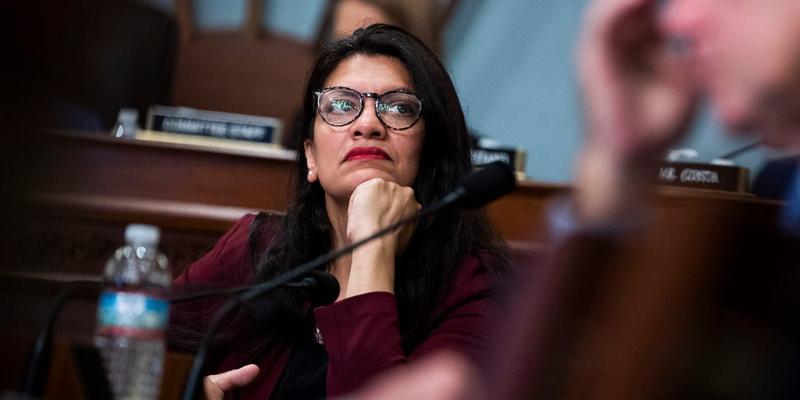Greenwald: 'Staggering' Detroit poll exposes 'wide gap' between media and 'everyone else' on policing



In media news today, a CNN panel agrees that Hunter Biden's art sales are an ethics issue, Andrew Cuomo accuser Lindsey Boylan slams brother Chris and asks whether he 'also harassed and assaulted' women, and NBC has a 33-year low viewership for Tokyo Olympics
Journalist Glenn Greenwald shared a new poll out of Detroit, Mich., that he argued ripped a hole in the narrative from certain "media elites" who have appeared to try and paint the police as systematically racist or suggest they should be defunded.
"By an overwhelming 9-1, they would feel safer with more cops on the street, not fewer," a new USA TODAY/Suffolk University/Detroit Free Press Poll found after surveying Detroit residents. "Though one-third complain that Detroit police use force when it isn't necessary - and Black men report high rates of racial profiling - those surveyed reject by 3-1 the slogan of some progressives to 'defund the police.'"
One in five residents in the city, whose congressional representation includes far-left, 'Defund the Police' advocate Rep. Rashida Tlaib, cited public safety as the biggest issue facing the city at 19%. Only education ranked higher at 23%.
"These are staggering new poll numbers from @USATODAY on the views of Detroit residents on issues of crime and policing, and constitute yet more evidence of how wide the gap is between the discourse of media elites on these questions and everyone else," Greenwald tweeted.
Greenwald cited figures from the poll that showed Black residents in Detroit care more about stopping violent crime than they do about reforming the police, while White residents care more about reforming the police by a small margin, to conclude, "Who is most victimized by crime and who isn't is a huge factor in the discourse on these issues."
"Black residents ranked crime at the top of their list of concerns: 24% cited public safety, and just 3% named police reform. But white residents were a bit more concerned about police reform than public safety, 12% compared with 10%. Education was by far the biggest issue on their minds, named by 31%," according to the survey.
Locals interviewed by USA Today told the outlet that there are "always some random shootings" and that they're often afraid to leave their homes to even perform routine tasks like buy gasoline.
Yet over the past year some media pundits have offered traction to the "Defund the Police" movement following high profile, police-involved deaths such as the murder of George Floyd last year in Minneapolis and have suggested that cops can't be trusted. In April MSNBC's Joy Reid told viewers it's "very difficult to trust" police officers when it came to the fatal police shooting of 16-year-old Ma'Khia Bryant in Columbus, Ohio.
Critics have also accused the media of downplaying the rise in crime in major, mostly liberal-run cities, despite statistics showing upticks in shootings and homicides in places like New York City, Portland, Chicago, Atlanta, Philadelphia, and Seattle.
Others who assessed the Detroit poll results agreed with Greenwald's conclusion that the media has little to no clue of what ordinary citizens want from their communities.
"Another reminder that the national media narrative really doesn't set local priorities the way the very-online-crowd would have you think," said one Twitter user.
"Cross tabs on this are incredible," @GOP Deputy Comms Director Zach Parkinson said in reaction to the USA Today poll. "Every single demographic in Detroit wants more police in their neighborhoods, and it's not even close."
Progressive Democrats like Tlaib who make up the Squad have promoted the Defund the Police effort. The National Journal's Josh Kraushaar wondered if her views left her vulnerable to a more pro-police primary challenger in her blue district.
Recent surveys show that Americans have little trust in today's media. The United States ranked last among 46 countries when it comes to public trust in the media, according to a June study commissioned by the Reuters Institute for the Study of Journalism, and conducted by YouGov. A more recently Gallup poll revealed that more than three-quarters of the public don't have much confidence in newspapers or television news. Only 21% of respondents said they had "a great deal" or "quite a lot" of confidence in newspapers, while only 16% of respondents reported the same of television news. Only Congress fared worse with 12%.
In fact, of the institutions in the Gallup poll, only the police found a bump in confidence in 2021.

 Article is LOCKED by author/seeder
Article is LOCKED by author/seeder






Question for our readers: How many of you believed the Police are racist scam?
No scam - there are lots of white supremacists/kkk/racist trash among the police. In the military also
Black residents want them back.
So they polled 'everyone else' in Detroit?
Have you ever lived there?
Says who? As usual you have no facts to support your baseless claim
I don't have time to provide the many many links to back up my truth. I'm sure Vic wouldn't allow them anyway.
No time to do some research? Why on earth not?
If there are "many many" links, I'm sure it won't take a couple of seconds for you to post a couple of them
Give it a try.
Evidence? Proof? There are no doubt a few such bad apples that are police and military persons but it’s not anywhere near a pervasive or systemic problem.
Beyond any doubt there are many many tens of thousands of racist police officers in America.
Because of the neighborhood I live in , I personally know about a dozen cops. Almost all of them are racially biased to one extent or another.
I have seen a half dozen or so off duty cops make jokes about "ni---ers" at a picnic.
People who say racism is not a big issue in US police departments are dreaming.
Only for space reasons is this list this short. To see the rest of it, go to There’s racial bias in our police systems. Here’s the overwhelming proof. - Washington Post
Policing and profiling
I’ve had more than one retired police officer tell me there is a running joke in law enforcement when it comes to racial profiling: It never happens . . . and it works. But the problem with trying to dismiss profiling concerns by noting that higher rates at which some minority groups commit certain crimes is that it overlooks the fact that huge percentages of black and Latino people have been pulled over, stopped on the street and generally harassed despite the fact that they have done nothing wrong. Stop-and-frisk data, for example, consistently show that about 3 percent of these encounters produce any evidence of a crime. So 97 percent-plus of these people are getting punished solely because they belong to a group that statistically commits some crimes at a higher rate. That ought to bother us.
Glenn Greenwald? Not known for any credibility.
He is a political hack who makes hacks cringe...
It's a USA TODAY/Suffolk University/Detroit Free Press Poll.
did you really expect any other reaction? (lol, I know you didn't but sometimes it's fun to poke the bear).
It all depends on what the poll in question is saying. These same people here who are refuting this poll sure seemed to be supporting polls in that other thread of yours where you had a poll about how pessimistic people are about the next 12 months. At least we don't need crib notes to know which polls are good and which ones are bad... /s
It's obvious to one and all, yet one of them said "I'm getting pounded here. It is funny.
The funny part is you believing you dont get pounded here every day.
The outrageous part is that you do. They have all but turned me into Walter Winchell. If that's a pounding, I'll take all you can muster!
A liberal who opposes pc woke cancel culture is a political hack?
Doesn't matter. Polls can be skewed to get the results they want
No kidding!
Yeah, we know. [deleted] do it all the time.
You mean like the one that said Biden's approval is above 50 percent?
Somebody was obviously desperate to get those results.